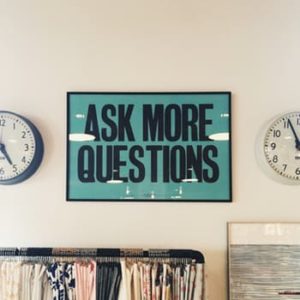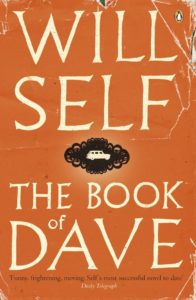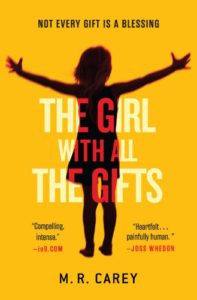 Years ago someone asked me what kind of science fiction books I like to read.
Years ago someone asked me what kind of science fiction books I like to read.
I’d hit a lull in that genre shortly before that conversation began, so it took a moment to come up with my answer. The last book I remembered reading and really loving at that point was by a popular, mainstream science fiction writer, so I mentioned their name.
The other person’s disgusted reaction to my answer made my heart sink. This clearly wasn’t an author they liked at all. The conversation quickly shifted to other topics.
Here’s what I wish they’d said to me instead:
Oh, that’s interesting. I’ve never really been able to get into that person’s work. What have you read recently from them? What did you like about it?
For the record, I definitely don’t expect everyone to like the same stuff I do. Life would be incredibly dull if everyone always read and watched the same material.
There are also authors out there whose books don’t appeal to me in any way. What is fresh and exciting to me might be boring or scary to someone else. Those authors have all found audiences who appreciate the kinds of stories they tell, though, and you can learn a lot about someone by figuring out what it is they like about a particular storyteller.
For example:
How Do They See the World?
Someone who reads a lot of historical mysteries set in New England, for example, might be a history buff or have a real knack for solving mysteries by noticing all of the important clues early on.
I don’t make assumptions about why someone likes the things they do, but it is fun to ask them more about it and see what they have to say. You can learn so much about someone’s perspective by exploring the reasons why they think a specific genre is the best thing ever.
What Do They Value?
I have a few friends who absolutely love romance novels. Their appreciation for happy endings and everlasting love makes me smile. It’s also shown me sides of their personalities that I probably wouldn’t have noticed otherwise.
Most people don’t go walking around telling others that they believe in the inherent goodness of humanity, after all, but you might catch a glimpse of this part of their mind if you probe for deeper answers. There is always a reason why someone likes the things that they do. Those reasons won’t always be the key to an important part of their personality, but sometimes they can be.
What Are They Afraid Of?
This won’t apply to everyone, of course, but one of the reasons why I like talking to people who read horror, thrillers, and similar types of tales is that you can learn a lot about what people find scary based on what parts of these genres they find appealing.
I love being scared, but I hate blood and gore. The kinds of horror novels I relish are almost entirely about what’s going on in the main character’s mind instead of anything the villain is physically doing to frighten them. Is he or she genuinely seeing those horrifying things, or is there a rational explanation for their nighttime visitors? Is there anything the main character is holding back from us, or can we completely trust their perspective?
 Do They Think You’d Like It?
Do They Think You’d Like It?
Another reason why it’s is a good idea to ask questions instead of make assumptions about people’s tastes in books is that you might find a new author or series you really like.
As a writer, I’ve been noticing a lot of stories that cross over with many other genres. While I usually prefer darker and more serious science fiction, I have been impressed by how creative some of those crossovers are. It takes a lot of hard work to blend, say, a zombiepocalypse with an engaging love story, but a lot of people have been making it work in wonderful ways.
The more you talk to people who love genres or writers that aren’t your cup of tea, the higher your chances become of stumbling across something incredible. I hope you’ll keep these points in mind the next time you have a conversation with someone like this.

 Twelve years ago I immigrated to Canada from the United States. Today I thought it would be fun to share a list of things I learned about moving up north that I found surprising, funny, or interesting.
Twelve years ago I immigrated to Canada from the United States. Today I thought it would be fun to share a list of things I learned about moving up north that I found surprising, funny, or interesting. Once I became a Permanent Resident, though, it quickly became clear that it’s a lot cheaper and easier for two young adults to go visit a few dozen relatives between the ages of 0 and 90+ than for those relatives to come up to Toronto.
Once I became a Permanent Resident, though, it quickly became clear that it’s a lot cheaper and easier for two young adults to go visit a few dozen relatives between the ages of 0 and 90+ than for those relatives to come up to Toronto. Is Every Child Your Child? A Tale of Courage and Determination
Is Every Child Your Child? A Tale of Courage and Determination

 Never Let Me Go
Never Let Me Go The Girl with All the Gifts
The Girl with All the Gifts  The Martian
The Martian As you might have already guessed, I am not a huge fan of this pastime. There is nothing relaxing to me about being surrounded by so many strangers in such a loud, bright place whose only purpose is to sell things to you that you don’t even necessarily need.
As you might have already guessed, I am not a huge fan of this pastime. There is nothing relaxing to me about being surrounded by so many strangers in such a loud, bright place whose only purpose is to sell things to you that you don’t even necessarily need. This time I ignored my urge to think about the background noise. Instead, I closed my eyes and let it all wash over me. It felt sort of like floating down a river. You can’t control where the current goes, but you can choose to relax and allow it to carry you downstream.
This time I ignored my urge to think about the background noise. Instead, I closed my eyes and let it all wash over me. It felt sort of like floating down a river. You can’t control where the current goes, but you can choose to relax and allow it to carry you downstream. I was surprised by how little I enjoyed the experience of walking through the mall while trying to clear my mind. After thinking about it, I suspect it was because there weren’t any signs of nature there. Trees, bushes, flowers, and small animals are soothing to me. I was also so busy trying to avoid running into other people that it was difficult to keep my mind clear of thoughts.
I was surprised by how little I enjoyed the experience of walking through the mall while trying to clear my mind. After thinking about it, I suspect it was because there weren’t any signs of nature there. Trees, bushes, flowers, and small animals are soothing to me. I was also so busy trying to avoid running into other people that it was difficult to keep my mind clear of thoughts. Is Seasonal Affective Disorder a Real Thing? How to Slay the SAD Beast
Is Seasonal Affective Disorder a Real Thing? How to Slay the SAD Beast It’s been a few weeks since I blogged about fitness. I stuck to my exercise routine pretty well during the holidays. (My diet, though, definitely had more treats included it than normal).
It’s been a few weeks since I blogged about fitness. I stuck to my exercise routine pretty well during the holidays. (My diet, though, definitely had more treats included it than normal). I’ve been keeping track of every book I read for the
I’ve been keeping track of every book I read for the Happy New Year!
Happy New Year!